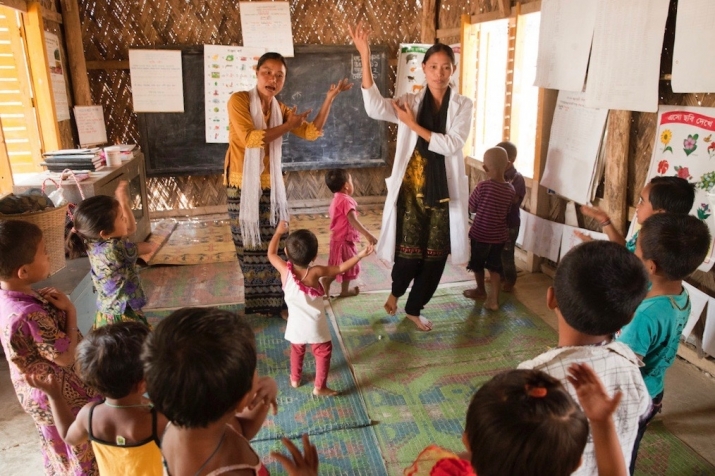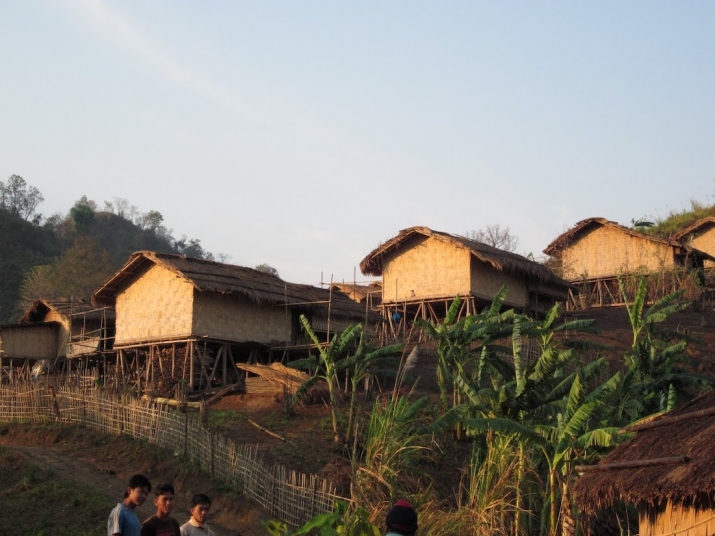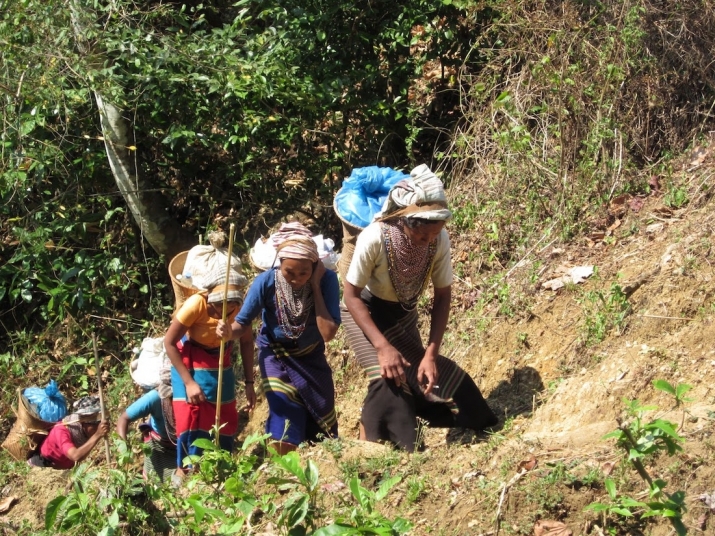NEWS
Forced Religious Conversion of Children in Bangladesh’s Chittagong Hill Tracts on the Rise
 Indigenous children attend a makeshift school in Bandarban funded by UNICEF. From UNICEF Bangladesh Flickr
Indigenous children attend a makeshift school in Bandarban funded by UNICEF. From UNICEF Bangladesh FlickrAn alarming growth in the incidence of forced religious conversion of indigenous children has been reported in the Chittagong Hill Tracts and other religious minority areas of Bangladesh. Recent reports from domestic media indicate that Islamic extremists have been targeting remote communities, luring parents with false promises of providing their children with a proper education in Dhaka and other developed cities, however the children often end up in madrasas (Islamic schools), where they are converted to Islam without the knowledge or consent of their parents.
The Christian Post cited a Dhaka Tribune report that on 1 January, police rescued four indigenous children in the southeastern district of Bandarban and arrested two persons involved in a trafficking and forced religious conversion ring. Aung Thwai Ching Marma, a parent of one of the victims, told the newspaper that families had been pursuaded by the false hope of a better future for their children. Police investigations revealed that Islamic radicals either used local indigenous names or cultivated relationships with adults in the community to convince the parents to trust them.
“The children were aged 9–13 and we have handed them over to their parents,” said Rafiq Ullah, officer-in-charge at Bandarban police station. “A trafficking case has been filed against the suspects and investigations are underway.” While admitting that trafficking and forced religious conversion of children by Islamic extremists is not a new phenomenon, the officer noted, “Over the years, we have rescued children and arrested people involved in trafficking and forced conversions. We will continue busting this crime ring.” (Herald Malaysia Online)
 A village in Thanchi, one of the remotest areas of Bandarban. Photo by Sadik Chowdhury
A village in Thanchi, one of the remotest areas of Bandarban. Photo by Sadik ChowdhuryThe Chittagong Hill Tracts region of southeastern Bangladesh is home to more than 11 indigenous communities, the majority of whom practice Theravada Buddhism. Poverty and a lack of access to proper education are still day-to-day concerns for communities in the area, which have long been targeted by religious extremists and Christian missionaries. Peter McNee, a Baptists pastor from New Zealand and Christian propagandist and author, highlighted the conversion of indigenous people to Christianity in the context of the region’s various problems: “The greatest gift we can give to Bangladesh is a Christianized Hill Tracts population. The Tribals are under pressure from many directions. . . . The Hill Tracts is a top priority for evangelistic effort.” (McNee 1976, 83) In particular, he mentions targeting the Tripura community (sometimes known as “Tipperash”), members of which follow Theravada Buddhism, Hinduism, and Christianity. However, with the growth in Buddhist temples in the region, the number of Christian missionaries has since declined.
Over the last seven years police are reported to have rescued 72 children belonging to indigenous communities in the region. In January 2010, 33 Buddhist children were rescued after being lured with the promise of being admitted to a school in Dhaka. Three suspects were arrested during a police raid. In the following month, police arrested one Mohan Tripura and rescued 16 more children that police believe were headed fro madrasas in Dhaka.
 Indigenous women return to their village from work. Photo by Sadik Chowdhury
Indigenous women return to their village from work. Photo by Sadik ChowdhuryNemkim Baum, head of the Bolipara Women Welfare Society, an NGO partner of the Bangladesh Child Rights Forum, accused the extremists of exploiting the simplicity, poverty, and lack of awareness among indigenous people: “This is one of [the] country’s remotest places, where development and economic prosperity are still a far cry away. So when people have [the] slightest opportunity for prosperity, they don’t hesitate to accept the offer. This is how Islamists target indigenous peoples.” She added that a single organization could not handle this problem without assistance from the government and other community groups. “The government, NGOs, and local communities need to be involved in spreading awareness among [the] people—they don’t know what is happening in other parts of the country and they must be made aware of it,” she emphasized. (Herald Malaysia Online)
References
McNee, Peter. 1976. Crucial Issues in Bangladesh. Pasadena: William Carey Library.
See more
Forced conversion of Bangladeshi tribal kids on the rise (Herald Malaysia Online)
Chittagong Hill Tracts: Forced Religious Conversion and Human Trafficking Threaten Indigenous Children (UNPO)
Child Trafficking Victims Taken From Parents in Bangladesh Forced to Convert to Islam (The Christian Post)
Related news from Buddhistdoor Global
Head Monk of Charitable Bangladeshi Monastery Receives Death Threats
Buddhist Monastery in Bangladesh Feeds Hundreds of Poor Families During Ramadan
Three Arrested for Murder of Buddhist Monk in Bangladesh
Ancient Buddhist Temple and Stupas Unearthed in Bangladesh
Related features from Buddhistdoor Global
“Reflections from the Land of Rivers:” Rangamati, First Encounter with the Chittagong Hill Tracts
“Buddhist Voices from the Land of Rivers:” Moanoghar, Beacon of Hope
“Buddhist Voices from the Land of Rivers:” Looking from the Inside Out
“Buddhist Voices from the Land of Rivers:” In Conversation with Venerable Buddhadatta














